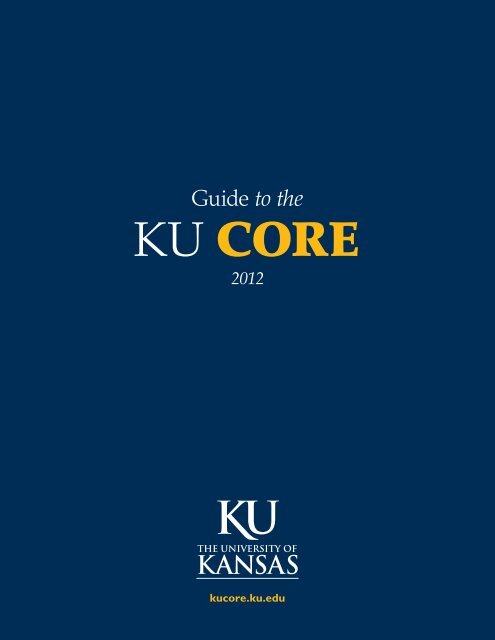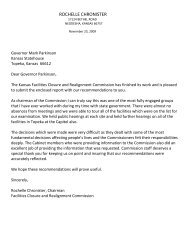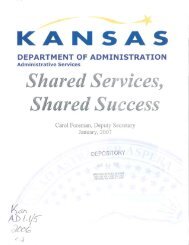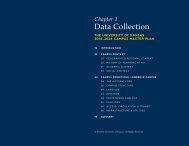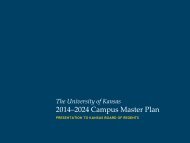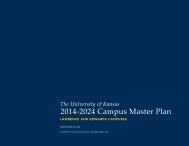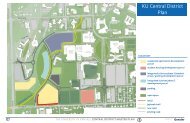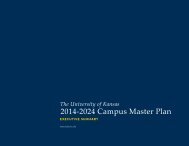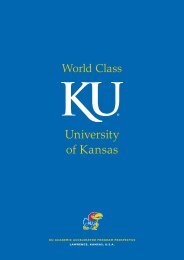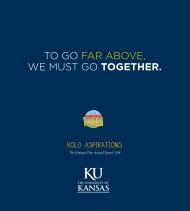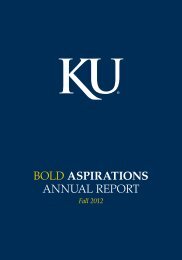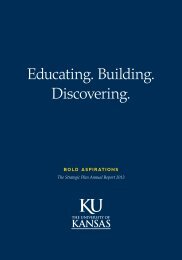Guide to the KU Core
Introduction to KU's first university-wide undergraduate curriculum, prepared for faculty, department chairs, and students.
Introduction to KU's first university-wide undergraduate curriculum, prepared for faculty, department chairs, and students.
Create successful ePaper yourself
Turn your PDF publications into a flip-book with our unique Google optimized e-Paper software.
<strong>Guide</strong> <strong>to</strong> <strong>the</strong><br />
<strong>KU</strong> CORE<br />
2012<br />
kucore.ku.edu
Introduction<br />
Nothing is more important at <strong>the</strong> University of Kansas, <strong>the</strong> state’s flagship institution,<br />
than providing a world-class education and preparing our undergraduate students for<br />
successful lives and prosperous careers.<br />
The <strong>KU</strong> <strong>Core</strong>, a comprehensive curriculum for all <strong>KU</strong> undergraduate students, meets this<br />
mandate. The multi-year planning process — <strong>the</strong> chancellor’s task force on Retention<br />
and Graduation, <strong>the</strong> strategic planning work group on Energizing <strong>the</strong> Educational<br />
Environment, six satellite committees, <strong>the</strong> transition committee, and <strong>the</strong> new University<br />
<strong>Core</strong> Curriculum Committee — will soon culminate in a vibrant, university-wide<br />
curriculum that meets <strong>the</strong> needs of and challenges faced by 21st century students.<br />
This guide provides detailed information on <strong>the</strong> major aspects of <strong>the</strong> <strong>KU</strong> <strong>Core</strong> and is your<br />
resource when you visit kucore.ku.edu <strong>to</strong> nominate courses and experiences <strong>to</strong> be part<br />
of <strong>the</strong> curriculum.<br />
We offer our deepest gratitude <strong>to</strong> <strong>the</strong> <strong>KU</strong> community for <strong>the</strong> tremendous effort that has<br />
made this major accomplishment possible. As we continue <strong>to</strong> work <strong>to</strong>ward our vision of<br />
being recognized as a <strong>to</strong>p-tier public international research university, <strong>the</strong> <strong>KU</strong> <strong>Core</strong> will<br />
be at <strong>the</strong> center of our transformation.<br />
Bernadette Gray-Little<br />
Chancellor<br />
Jeffrey S. Vitter<br />
Provost and Executive Vice Chancellor<br />
GUIDE <strong>to</strong> <strong>the</strong> <strong>KU</strong> <strong>Core</strong> | 3
Contents<br />
Overview<br />
7 The <strong>KU</strong> <strong>Core</strong><br />
8 Fulfilling <strong>the</strong> <strong>KU</strong> <strong>Core</strong><br />
10 Progression<br />
11 Distribution of <strong>the</strong> 12 Units<br />
Developing <strong>the</strong> curriculum<br />
14 Proposing Courses for <strong>the</strong> <strong>KU</strong> <strong>Core</strong><br />
16 The <strong>KU</strong> <strong>Core</strong> Nomination Process<br />
Education Goals, Learning outcomes, and criteria<br />
20 General Education Goal:<br />
Build <strong>Core</strong> Skills of Critical Thinking and Quantitative Literacy<br />
21 General Education Goal:<br />
Streng<strong>the</strong>n Written and Oral Communication<br />
22 General Education Goal:<br />
Develop a Background of Knowledge Across Fundamental<br />
Areas of Study<br />
23 Advanced Education Goal:<br />
Respect Human Diversity and Expand Cultural Understanding<br />
and Global Awareness<br />
24 Advanced Education Goal:<br />
Practice Social Responsibility and Demonstrate Ethical Behavior<br />
25 Advanced Education Goal:<br />
Gain <strong>the</strong> Ability <strong>to</strong> Integrate Knowledge and Think Creatively<br />
GUIDE <strong>to</strong> <strong>the</strong> <strong>KU</strong> <strong>Core</strong> | 5
The <strong>KU</strong> <strong>Core</strong><br />
Effective Fall 2013, <strong>the</strong> <strong>KU</strong> <strong>Core</strong> is <strong>the</strong> university-wide curriculum that all incoming<br />
undergraduate students will complete as part of <strong>the</strong>ir degree requirements.<br />
The <strong>KU</strong> <strong>Core</strong> spans our undergraduate experience. It comprises three general education<br />
goals and three advanced education goals.<br />
The <strong>Guide</strong> <strong>to</strong> <strong>the</strong> <strong>KU</strong> <strong>Core</strong> outlines how students will achieve <strong>the</strong>se six goals,<br />
details learning outcomes associated with each goal, and describes how we will build<br />
<strong>the</strong> <strong>KU</strong> <strong>Core</strong> curriculum.<br />
General Education Goals<br />
Critical Thinking and Quantitative Literacy<br />
Communication<br />
Breadth of Knowledge<br />
Advanced Education Goals<br />
Culture and Diversity<br />
Social Responsibility and Ethics<br />
Integration and Creativity<br />
GUIDE <strong>to</strong> <strong>the</strong> <strong>KU</strong> <strong>Core</strong> | 7
Fulfilling <strong>the</strong> <strong>KU</strong> <strong>Core</strong><br />
The <strong>KU</strong> <strong>Core</strong> is all about flexibility. Unlike most current education requirements,<br />
<strong>the</strong> goals and outcomes of <strong>the</strong> <strong>KU</strong> <strong>Core</strong> can be met through a diversity of courses and<br />
educational experiences.<br />
Fulfilling <strong>the</strong> requirements of <strong>the</strong> <strong>KU</strong> <strong>Core</strong> curriculum entails successfully completing 12<br />
units across <strong>the</strong> six education goals.<br />
What is a unit?<br />
A <strong>KU</strong> <strong>Core</strong> unit can be<br />
• A single approved course (3-5 hours)<br />
• An approved educational experience<br />
• An approved combination or partnership of course work and experiences<br />
8 | GUIDE <strong>to</strong> <strong>the</strong> <strong>KU</strong> <strong>Core</strong>
What is an approved educational experience?<br />
Educational experiences include activities such as participating in substantial<br />
study abroad, completing an undergraduate research project, or engaging in<br />
service learning.<br />
Lists of approved experiences and <strong>the</strong> application process can be found at<br />
kucore.ku.edu.<br />
What is an approved combination?<br />
In some cases, a unit may be achieved by taking a series of courses that <strong>to</strong>ge<strong>the</strong>r<br />
address all required components of a learning outcome.<br />
Such a series of courses may be required <strong>to</strong> complete a major or meet multiple<br />
<strong>KU</strong> <strong>Core</strong> goals. Also, course work and o<strong>the</strong>r educational experiences such as<br />
service learning may be combined <strong>to</strong> complete a unit.<br />
Lists of approved course series or combinations of classroom and o<strong>the</strong>r<br />
educational experiences can be found at kucore.ku.edu.<br />
The University<br />
<strong>Core</strong> Curriculum<br />
Committee<br />
The University <strong>Core</strong><br />
Curriculum Committee<br />
(UCCC) will set guidelines<br />
and have final approval of<br />
<strong>the</strong> elements included in<br />
<strong>the</strong> <strong>KU</strong> <strong>Core</strong>.<br />
The committee includes<br />
one voting representative<br />
from each of <strong>the</strong> five<br />
divisions of <strong>the</strong> College of<br />
Liberal Arts and Sciences<br />
and one from each of <strong>the</strong><br />
professional schools with<br />
undergraduate programs.<br />
Voting members of <strong>the</strong><br />
committee are tenured<br />
or tenure-track faculty<br />
serving three-year<br />
renewable terms. Three<br />
students serve one-year<br />
terms as voting members<br />
on policy matters.<br />
Three additional members<br />
— one representative<br />
each from <strong>the</strong> libraries,<br />
undergraduate studies,<br />
and undergraduate<br />
programs at <strong>KU</strong>MC<br />
— serve as ex officio,<br />
nonvoting members.<br />
GUIDE <strong>to</strong> <strong>the</strong> <strong>KU</strong> <strong>Core</strong> | 9
Progression<br />
General education goals will be best met early in a student’s undergraduate career.<br />
Advanced education goals are most appropriately acquired using <strong>the</strong> foundation of knowledge<br />
that is gained from <strong>the</strong> general education goals and progression through <strong>the</strong> major. In particular,<br />
<strong>the</strong> sixth goal, Integration and Creativity, can be considered a caps<strong>to</strong>ne experience.<br />
By completing <strong>the</strong> <strong>KU</strong> <strong>Core</strong>, <strong>the</strong> successful graduate will<br />
• Acquire essential skills<br />
• Build a broad background of knowledge<br />
• Have a stronger appreciation for cultural and global diversity<br />
• Cultivate ethical integrity<br />
• Generate <strong>the</strong> capacity and opportunity <strong>to</strong> blend and create ideas<br />
Freshman Sophomore Junior Senior<br />
Fall Semester Spring Semester Fall Semester Spring Semester Fall Semester Spring Semester Fall Semester Spring Semester<br />
Critical Thinking and quantitative literacy<br />
communication<br />
Breadth of Knowledge<br />
culture and Diversity<br />
social responsibility and Ethics<br />
Integration and Creativity<br />
THE <strong>KU</strong> CORE<br />
10 | GUIDE <strong>to</strong> <strong>the</strong> <strong>KU</strong> <strong>Core</strong>
Distribution of <strong>the</strong> 12 Units<br />
Critical Thinking and<br />
Quantitative Literacy<br />
Requires two units, one meeting criteria associated with<br />
learning outcome No. 1 and one meeting criteria associated<br />
with learning outcome No. 2.<br />
Communication<br />
Requires three units, two that meet <strong>the</strong> criteria associated<br />
with learning outcome No. 1 and one that meets criteria<br />
associated with learning outcome No. 2.<br />
Breadth of Knowledge<br />
Requires three units, one each meeting <strong>the</strong> stated criteria<br />
for <strong>the</strong> arts and humanities, <strong>the</strong> natural sciences, and <strong>the</strong><br />
social sciences.<br />
Culture and Diversity<br />
Requires two units that may be<br />
• A unit meeting Learning Outcome 1 and a unit meeting<br />
Learning Outcome 2, or<br />
• A unit meeting Learning Outcome 1 and a significant<br />
study abroad experience.<br />
Social Responsibility and Ethics<br />
Requires one unit that may be<br />
• A single course, or<br />
• A combination of courses, or<br />
• Course work partnered with community-service work that<br />
takes students outside <strong>the</strong> classroom.<br />
Integration and Creativity<br />
Requires one unit that may be<br />
• A single course, or<br />
• An approved educational experience, or<br />
• An approved integration of courses and/or experiences.<br />
GUIDE <strong>to</strong> <strong>the</strong> <strong>KU</strong> <strong>Core</strong> | 11
Developing <strong>the</strong><br />
Curriculum
Proposing Courses for <strong>the</strong> <strong>KU</strong> <strong>Core</strong><br />
The nomination form can be found on <strong>the</strong> <strong>KU</strong> <strong>Core</strong> website (kucore.ku.edu) and asks for <strong>the</strong><br />
following information:<br />
• Contact details for a point person or team leader in <strong>the</strong> sponsoring department who can<br />
provide answers <strong>to</strong> questions about <strong>the</strong> course or educational experience.<br />
• Information about <strong>the</strong> course that is being nominated for inclusion in <strong>the</strong> <strong>KU</strong> <strong>Core</strong>.<br />
• Justification for inclusion in <strong>the</strong> <strong>KU</strong> <strong>Core</strong>, including how <strong>the</strong> course or educational experience<br />
will meet <strong>the</strong> criteria of each learning outcome that it is proposed <strong>to</strong> fulfill.<br />
• Evidence of student achievement, providing direct confirmation that students have met <strong>the</strong><br />
criteria of <strong>the</strong> learning outcome.<br />
Recertification <strong>to</strong> <strong>the</strong> <strong>KU</strong> <strong>Core</strong><br />
The <strong>KU</strong> <strong>Core</strong> courses and educational experiences will be reviewed periodically and considered<br />
for continued inclusion in <strong>the</strong> <strong>KU</strong> <strong>Core</strong> curriculum.<br />
14 | GUIDE <strong>to</strong> <strong>the</strong> <strong>KU</strong> <strong>Core</strong>
Filling out <strong>the</strong> online nomination form<br />
Faculty members may find <strong>the</strong> following information <strong>to</strong> be helpful before beginning <strong>the</strong><br />
online nomination process:<br />
• Course description, including any prerequisites<br />
• Course syllabus<br />
• Copies of all exams, projects, and assignments, including any Alternative Break or<br />
community service projects<br />
The <strong>KU</strong> <strong>Core</strong> website (kucore.ku.edu) contains sample rubrics <strong>to</strong> assist faculty in<br />
evaluating what students have learned.<br />
GUIDE <strong>to</strong> <strong>the</strong> <strong>KU</strong> <strong>Core</strong> | 15
The <strong>KU</strong> <strong>Core</strong> Nomination Process<br />
Professor completes form<br />
To department for approval<br />
Department OKs<br />
To School/College for approval<br />
To UCCC as advance notice<br />
of a nomination<br />
School/College OKs,<br />
sends <strong>to</strong> UCCC for final approval<br />
UCCC OKs<br />
Course becomes a<br />
CORE course<br />
• If more documentation is needed at any approval level, <strong>the</strong> form will be returned <strong>to</strong> <strong>the</strong><br />
nominating professor with comments.<br />
16 | GUIDE <strong>to</strong> <strong>the</strong> <strong>KU</strong> <strong>Core</strong>
Education Goals,<br />
Learning Outcomes,<br />
and Criteria
General Education Goal<br />
Build core skills of critical thinking<br />
and quantitative literacy<br />
• Ga<strong>the</strong>r and evaluate information, analyze<br />
numerical data, raise relevant questions, build sound<br />
arguments, generate and test hypo<strong>the</strong>ses<br />
• Weigh alternative evidence, compare and<br />
interpret texts<br />
• Analyze numerical data and apply<br />
ma<strong>the</strong>matical principles<br />
• Become rigorous, versatile, and agile thinkers<br />
Developing <strong>the</strong> capacity for critical and quantitative<br />
reasoning helps students ga<strong>the</strong>r and evaluate<br />
information, raise relevant questions, build sound<br />
arguments, weigh alternative evidence and reasoning,<br />
generate and test hypo<strong>the</strong>ses, compare and interpret<br />
texts, and become rigorous, versatile, and agile thinkers.<br />
With <strong>the</strong> ability <strong>to</strong> make informed choices, <strong>the</strong> experience<br />
of applying standards of evidence and principles of logic,<br />
and <strong>the</strong> confidence <strong>to</strong> question assumptions (<strong>the</strong>ir own<br />
and those of o<strong>the</strong>rs), students will be better prepared <strong>to</strong><br />
understand diverse perspectives, adapt <strong>to</strong> challenging<br />
situations, and perform effectively in society.<br />
This goal requires two units.<br />
One unit meeting Learning Outcome 1 and one unit<br />
meeting Learning Outcome 2<br />
Learning Outcome 1: Upon reaching this goal, students<br />
will be able <strong>to</strong> analyze and evaluate assumptions, claims,<br />
evidence, arguments, and forms of expression; select and<br />
apply appropriate interpretive <strong>to</strong>ols.<br />
Students can meet this learning outcome through course<br />
work, through an approved educational experience, or<br />
by completing an independent research project.<br />
Courses or educational experiences that meet this<br />
outcome must achieve all of <strong>the</strong> following:<br />
1. Focus substantially on critical thinking as stated in<br />
<strong>the</strong> learning outcome.<br />
2. Include assignments, projects, and/or tests that<br />
require students <strong>to</strong><br />
a. Form judgments about <strong>the</strong> assumptions or claims<br />
presented.<br />
b. Analyze and syn<strong>the</strong>size information.<br />
c. Make evidence-based arguments <strong>to</strong> support<br />
conclusions.<br />
3. Evaluate student performance in <strong>the</strong> tasks above,<br />
and use this evaluation for a supermajority of <strong>the</strong><br />
final course grade.<br />
Satisfying this outcome through a workplace or<br />
research experience must meet <strong>the</strong> following criteria:<br />
1. Enroll in a special <strong>to</strong>pics or undergraduate research<br />
course (ei<strong>the</strong>r for credit or not).<br />
2. Submit a report documenting how <strong>the</strong> experience<br />
meets <strong>the</strong> first two criteria above. The report must be<br />
submitted within a semester of project completion<br />
and must be accompanied by a letter of support from<br />
<strong>the</strong> student’s faculty or professional men<strong>to</strong>r.<br />
Learning Outcome 2: Upon reaching this goal, students<br />
will be able <strong>to</strong> define a problem, analyze numerical<br />
information, apply ma<strong>the</strong>matical principles, and integrate<br />
quantitative methods in<strong>to</strong> problem solving.<br />
Students can meet this learning outcome through<br />
course-based instruction.<br />
Courses that meet this outcome must achieve all of <strong>the</strong><br />
following:<br />
1. Focus on solving problems using functions and<br />
numerical techniques.<br />
2. Require students <strong>to</strong> apply ma<strong>the</strong>matical or statistical<br />
principles <strong>to</strong> organize or process numerical<br />
information.<br />
3. Require students <strong>to</strong> use specific quantitative<br />
methods <strong>to</strong> solve problems and choose appropriate<br />
methods for given problems.<br />
4. Evaluate student performance in <strong>the</strong> tasks above and<br />
use this evaluation for a supermajority of <strong>the</strong> final<br />
course grade.<br />
20 | GUIDE <strong>to</strong> <strong>the</strong> <strong>KU</strong> <strong>Core</strong>
General Education Goal<br />
Streng<strong>the</strong>n written and<br />
oral communication<br />
• Generate, explore, organize, and convey ideas<br />
• Engage diverse audiences in writing and orally using<br />
language, media, and presentation skills<br />
• Present thoughts and opinions clearly, confidently,<br />
and appropriately<br />
Communicating with o<strong>the</strong>rs, both in writing and<br />
orally, lies at <strong>the</strong> heart of personal and professional<br />
growth and success. The ability <strong>to</strong> engage with diverse<br />
audiences and ideas in writing and speaking supports<br />
personal relationships, educational development,<br />
professional advancement, and civic engagement.<br />
Using language flexibly and confidently supports<br />
critical and integrative thinking by allowing students<br />
<strong>to</strong> generate and examine fully <strong>the</strong>ir ideas and engage<br />
with multiple perspectives.<br />
This goal requires three units.<br />
Two units meeting Learning Outcome 1 and one unit<br />
meeting Learning Outcome 2<br />
Learning Outcome 1: Upon reaching this goal, students<br />
will be able <strong>to</strong> generate, explore, organize, and convey ideas<br />
in writing, using language and o<strong>the</strong>r media (for example,<br />
digital texts, images, and graphs) <strong>to</strong> present those ideas<br />
clearly, confidently, and in a manner appropriate <strong>to</strong> specific<br />
communication situations.<br />
This learning outcome requires six hours of university<br />
course work during <strong>the</strong> first two years, at least three<br />
hours of which require inquiry-based writing. Because<br />
it is important <strong>to</strong> develop written communication<br />
continually, three hours emphasizing writing in <strong>the</strong><br />
major are highly recommended.<br />
Each of <strong>the</strong> two three-credit hour courses that meet<br />
this outcome must achieve all of <strong>the</strong> following:<br />
1. Include instruction that will require students <strong>to</strong><br />
a. Analyze how language and rhe<strong>to</strong>rical choices vary<br />
across texts and different institutional, his<strong>to</strong>rical,<br />
and/or public contexts.<br />
b. Demonstrate rhe<strong>to</strong>rical flexibility within and<br />
beyond academic writing.<br />
c. Revise and improve <strong>the</strong>ir own writing.<br />
2. Require writing assignments (a minimum of 2,000<br />
words/course) in English and include at least three<br />
different types of writing for different purposes,<br />
audiences, or media.<br />
3. Deliver structured feedback <strong>to</strong> students that leads <strong>to</strong><br />
revision and sequential improvement of <strong>the</strong>ir texts (for<br />
example, through <strong>the</strong> revision of successive drafts).<br />
4. Evaluate <strong>the</strong> quality of students’ written<br />
communication and use this evaluation for a<br />
supermajority of <strong>the</strong> final course grade.<br />
Learning Outcome 2: Upon reaching this goal, students<br />
will be able <strong>to</strong> generate, develop, organize, and convey ideas<br />
orally, using language, presentation skills, and o<strong>the</strong>r media<br />
(for example, digital texts, images, and graphs) <strong>to</strong> present<br />
those ideas clearly, confidently, and in a manner appropriate<br />
<strong>to</strong> specific communication situations.<br />
This learning outcome requires three hours of<br />
university course work or university-approved<br />
equivalent (for example, active membership in <strong>the</strong><br />
<strong>KU</strong> Debate Team or significant participation in<br />
organizations such as Toastmasters).<br />
Courses or educational experiences that meet this<br />
outcome must achieve all of <strong>the</strong> following:<br />
1. Include instruction that will require students <strong>to</strong><br />
a. Apply <strong>the</strong>ory in <strong>the</strong> preparation and presentation<br />
of content in an organized manner and with a<br />
delivery appropriate <strong>to</strong> <strong>the</strong> audience.<br />
b. Engage in active listening and participate in<br />
discussions in a respectful manner.<br />
c. Analyze <strong>the</strong>ir own communicative behaviors in<br />
both interpersonal and public speaking.<br />
2. Include assignments structured so that students<br />
complete at least three different types of speeches or<br />
presentations in English with different purposes or<br />
audiences.<br />
3. Deliver structured feedback <strong>to</strong> students that leads <strong>to</strong><br />
revision and substantial improvement.<br />
4. Evaluate <strong>the</strong> quality of students’ oral communication,<br />
and use this evaluation for a supermajority of <strong>the</strong> final<br />
course grade.<br />
GUIDE <strong>to</strong> <strong>the</strong> <strong>KU</strong> <strong>Core</strong> | 21
General Education Goal<br />
Develop a background of knowledge<br />
across fundamental areas of study<br />
• Acquire knowledge across a broad range<br />
of disciplines<br />
• Gain a critical appreciation of <strong>the</strong> origin and depth<br />
of human achievement in diverse disciplines<br />
Contemporary citizen-scholars comprehend and<br />
appreciate how knowledge across a broad range of<br />
disciplines is developed and have a fundamental<br />
understanding of <strong>the</strong> breadth of human achievement<br />
in diverse branches of knowledge and <strong>the</strong> arts.<br />
Participating in courses and experiences that establish<br />
such a breadth of knowledge takes students beyond<br />
<strong>the</strong> focus of <strong>the</strong>ir academic major(s), promoting <strong>the</strong><br />
integration of ideas and knowledge and exposing <strong>the</strong>m<br />
<strong>to</strong> possibilities for wider thought and action.<br />
This goal requires three units.<br />
One unit each meeting <strong>the</strong> Learning Outcome from<br />
• The arts and humanities<br />
• The natural sciences<br />
• The social sciences<br />
Learning Outcome: Upon reaching this goal, students<br />
will be able <strong>to</strong> demonstrate basic competence in <strong>the</strong><br />
principles, <strong>the</strong>ories, and analytic methods used in each of<br />
<strong>the</strong> following: arts and humanities, natural sciences, and<br />
social sciences.<br />
Courses or educational experiences approved as<br />
meeting this outcome must achieve <strong>the</strong> following, as<br />
relevant <strong>to</strong> <strong>the</strong> particular field of study:<br />
1. Include a curriculum for <strong>the</strong> course or experience<br />
that will move students from <strong>the</strong>ir current<br />
knowledge <strong>to</strong> a deeper understanding of specific<br />
concepts. Assignments must allow students <strong>to</strong><br />
demonstrate <strong>the</strong>ir understanding of <strong>the</strong> concepts.<br />
2. Include learning activities that syn<strong>the</strong>size <strong>the</strong><br />
development over time of <strong>the</strong> principles, <strong>the</strong>ories,<br />
and analytical methods being taught. Assignments<br />
must allow students <strong>to</strong> demonstrate <strong>the</strong>ir functional<br />
understanding of <strong>the</strong> development of <strong>the</strong>se<br />
principles, <strong>the</strong>ories, and analytical methods.<br />
3. Include learning activities designed <strong>to</strong> integrate <strong>the</strong><br />
analysis of contemporary issues with principles,<br />
<strong>the</strong>ories, and analytical methods. Assignments or<br />
activities must allow students <strong>to</strong> demonstrate <strong>the</strong>ir<br />
capability <strong>to</strong> analyze contemporary issues based on<br />
<strong>the</strong> principles, <strong>the</strong>ories, and analytical methods in<br />
<strong>the</strong> academic area.<br />
22 | GUIDE <strong>to</strong> <strong>the</strong> <strong>KU</strong> <strong>Core</strong>
Advanced Education Goal<br />
Practice social responsibility and<br />
demonstrate ethical behavior<br />
• Gain a strong sense of intellectual integrity<br />
and moral behavior<br />
• Recognize ethical issues in a variety of settings, have<br />
enhanced social and civic responsibility, and gain<br />
awareness for <strong>the</strong> physical and social environment<br />
To lead productive and meaningful lives, students<br />
should develop within and across disciplines a strong<br />
sense of intellectual integrity and moral behavior,<br />
recognize ethical issues in a variety of settings, enhance<br />
social and civic responsibility, and gain an awareness of<br />
and sensitivity for <strong>the</strong>ir physical and social environment.<br />
This goal requires one unit from ei<strong>the</strong>r<br />
Learning Outcome.<br />
This goal may be met by (1) a single course, (2) a<br />
combination of courses, or (3) course work partnered<br />
with community-service work that takes students<br />
outside <strong>the</strong> classroom. Although such a partnership<br />
will not be possible for all students, it would result<br />
in <strong>the</strong> best opportunity for a student <strong>to</strong> understand<br />
<strong>the</strong> relationship of ethics <strong>the</strong>ories and principles<br />
<strong>to</strong> concepts of social responsibility reflected in<br />
community service.<br />
Learning Outcome 1: Upon reaching this goal, students<br />
will be able <strong>to</strong> develop and apply a combination of<br />
knowledge and skills <strong>to</strong> demonstrate an understanding of<br />
social responsibility and ethical behavior.<br />
Students can meet this outcome through a single<br />
course or a combination of courses that must achieve<br />
all of <strong>the</strong> following:<br />
1. Present and apply distinct and competing ethics<br />
<strong>the</strong>ories, each of which articulates at least one<br />
principle for ethical decision-making. The<br />
combination of <strong>the</strong>ories and principles should<br />
address <strong>the</strong> concept of social responsibility, including<br />
responsibility <strong>to</strong> <strong>the</strong> physical environment.<br />
2. Include <strong>the</strong> presentation and application of ethical<br />
decision-making processes.<br />
3. Include presentation and application, as appropriate,<br />
of particular ethics codes.<br />
4. Include <strong>the</strong> application of principles, decisionmaking<br />
processes, and, as appropriate, ethics codes<br />
<strong>to</strong> specific ethical dilemmas (such as case studies) in<br />
which important values conflict.<br />
An approved combination of courses must substantially<br />
address <strong>the</strong>se four criteria. Within this combination of<br />
courses, each criterion must be a significant part of at least<br />
one course. A combination of such courses might be most<br />
easily achieved and coordinated within a particular major.<br />
Learning Outcome 2: Upon reaching this goal,<br />
students will be able <strong>to</strong> act on this understanding of social<br />
responsibility and ethical behavior <strong>to</strong> o<strong>the</strong>rs in <strong>the</strong>ir local,<br />
national, or global community, and contribute positively via<br />
leadership, collaboration, or o<strong>the</strong>r direct action.<br />
Students can meet this learning outcome through an<br />
educational experience that meets one or more of <strong>the</strong><br />
following criteria:<br />
1. Complete an Alternative Break experience of a<br />
minimum of one-week duration and enroll for credit<br />
in <strong>the</strong> Alternative Break course.<br />
a. The Alternative Break one-credit course must be<br />
reviewed <strong>to</strong> ensure <strong>the</strong> following:<br />
i. The course must include significant content on<br />
<strong>the</strong> ethics of volunteerism/service.<br />
ii. The course must require a reflection paper or<br />
similar assignment that includes <strong>the</strong> concepts of<br />
social responsibility and ethical decision-making.<br />
2. Complete a Certificate for Service Learning.<br />
a. The Center for Service Learning will administer<br />
this program and determine <strong>the</strong> criteria for<br />
earning <strong>the</strong> certificate. This designation appears<br />
on a student’s transcript. The required reflection<br />
paper or similar assignment must include (1)<br />
content on <strong>the</strong> ethics of volunteerism/service, and<br />
(2) concepts of social responsibility and ethical<br />
decision-making.<br />
3. Complete a departmental or school internship<br />
or practicum that meets a community need and<br />
addresses <strong>the</strong> following criteria:<br />
a. The internship/practicum must require evidence<br />
that <strong>the</strong> student understands and has practiced<br />
ethical behavior and ethical decision-making.<br />
b. The internship/practicum must require evidence<br />
that <strong>the</strong> student made a positive contribution <strong>to</strong><br />
<strong>the</strong> population served.<br />
24 | GUIDE <strong>to</strong> <strong>the</strong> <strong>KU</strong> <strong>Core</strong>
Advanced Education Goal<br />
Gain <strong>the</strong> ability <strong>to</strong> integrate knowledge<br />
and think creatively<br />
• Make new discoveries, generate original ideas,<br />
and find new ways of perceiving and expressing by<br />
integrating an array of courses and experiences<br />
• A culminating experience<br />
A successful education promotes thinking within<br />
or across disciplines <strong>to</strong> generate original ideas, <strong>to</strong><br />
be creative, and <strong>to</strong> find new ways of perception and<br />
expression. With such capabilities, students can make<br />
new discoveries that can effect major change and lead<br />
<strong>to</strong> innovation. Inherent in this goal is establishing<br />
integration across multiple courses and/or experiences<br />
as well as using an array of courses and experiences<br />
as <strong>the</strong> foundation for creative thinking. Thus, it is<br />
likely that this goal and <strong>the</strong>se learning outcomes will<br />
be satisfied later in a student’s career, after a solid<br />
foundation has been established.<br />
This goal requires one unit completed at<br />
<strong>the</strong> junior or senior level and meeting ei<strong>the</strong>r<br />
Learning Outcome.<br />
Examples of compliance include approved<br />
certificate programs, caps<strong>to</strong>ne courses or projects,<br />
a combination of courses, and sets of courses/<br />
experiences that coordinate <strong>to</strong> produce an integrated<br />
learning experience.<br />
Learning Outcome 1: Upon reaching this goal,<br />
students will be able <strong>to</strong> analyze and combine information<br />
from different areas within or across disciplines <strong>to</strong><br />
approach and explain existing questions and problems<br />
from new perspectives, <strong>to</strong> pose new questions, and <strong>to</strong><br />
generate new ideas.<br />
Learning Outcome 2: Upon reaching this goal,<br />
students will be able <strong>to</strong> think, react, and work in<br />
imaginative ways that produce innovative expressions<br />
and original perspectives.<br />
Courses, sets of courses, programs, educational<br />
experiences, and combinations of courses/experiences<br />
that meet <strong>the</strong>se outcomes must satisfy <strong>the</strong> following:<br />
1. Lead <strong>to</strong> integration of knowledge within or across<br />
disciplines.<br />
2. Include instruction or a project that explicitly involves<br />
integration of knowledge within or across disciplines.<br />
3. Require a creative product (for example, a<br />
performance, paper, or presentation).<br />
4. Be evaluated for integration and/or creative thinking.<br />
5. Be completed at <strong>the</strong> junior or senior level.<br />
Students can also meet this goal by completing a<br />
double major, a major and co-major, or a major and<br />
minor. In this option, students must develop a product<br />
<strong>to</strong> reflect integration and creative thinking across<br />
<strong>the</strong>ir majors, major/co-majors, or major/minors.<br />
These projects will be evaluated and certified by <strong>the</strong><br />
student’s faculty adviser on that product.<br />
GUIDE <strong>to</strong> <strong>the</strong> <strong>KU</strong> <strong>Core</strong> | 25
26 | GUIDE <strong>to</strong> <strong>the</strong> <strong>KU</strong> <strong>Core</strong>
Produced by <strong>the</strong> Office of Marketing Communications, 2013


